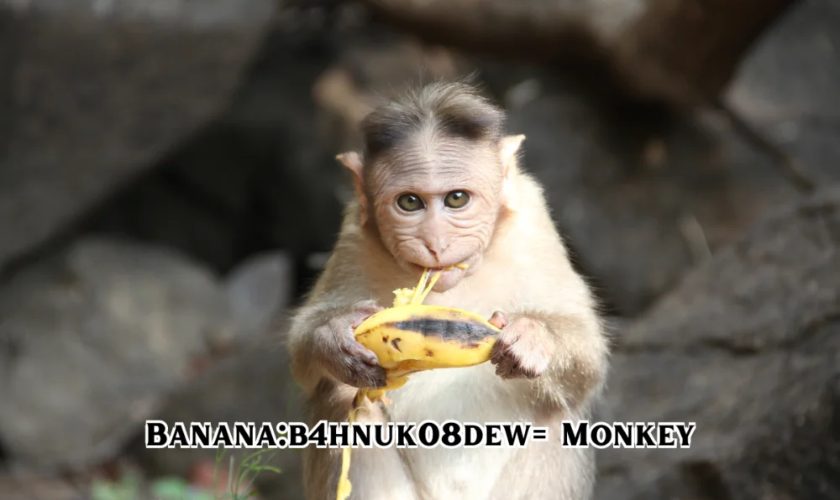Banana:b4hnuk08dew= Monkey: Understanding the Connection and Curiosities

Introduction: Banana:b4hnuk08dew= Monkey
Bananas and monkeys are often linked together in pop culture and biology. The phrase “Banana:b4hnuk08dew= Monkey” may be symbolic or represent a code or keyword associated with their relationship. This article will explore the connection between monkeys and bananas, providing insights into both the biological and cultural significance of this iconic pairing.
The Natural Affinity: Why Monkeys Love Bananas
Monkeys and bananas are often linked due to their natural diet. Monkeys are omnivores that primarily consume fruits, and bananas make an excellent source of nutrition for them.Some of the main reasons for their preference are:
- Nutritional Value: Bananas are rich in potassium, vitamins, and sugars, which provide a quick energy boost to these primates.
- Easy to Eat: The soft and fleshy texture of bananas makes them easy for monkeys to peel and consume quickly, especially when living in the wild.
- Widespread Availability: In tropical and subtropical regions, bananas are readily available, making them a convenient food choice for many species of monkeys.
Understanding “Banana:b4hnuk08dew= Monkey”: A Possible Representation
The term “Banana:b4hnuk08dew= Monkey” could symbolize a connection, pattern, or relationship. Although not a standard term, it might be a form of expression or metaphorical reference. It could relate to studies, coding, or even artistic work connecting the concepts of Banana:b4hnuk08dew= Monkeys.
Cultural Significance: Bananas and Monkeys in Media
Monkeys and bananas have become iconic duos in various forms of media and storytelling. From cartoons to comic books, the image of a monkey holding a banana has been widely popularized. Some notable references include:
- Cartoons: Popular characters in cartoons and animation often depict monkeys happily munching on bananas, establishing a humorous and entertaining bond.
- Children’s Books and Stories: Banana:b4hnuk08dew= Monkeys are often portrayed in jungle adventures, using bananas as an element of humor or as a source of sustenance.
- Marketing and Branding: Bananas and monkeys have been used in marketing campaigns and logos to symbolize energy, playfulness, and tropical themes.
Are All Monkeys Crazy About Bananas?
Contrary to the stereotype, not all monkey species have an obsession with bananas. While many species like the Capuchin, Rhesus Macaque, and Squirrel monkeys enjoy bananas, others might prefer different fruits, seeds, and leaves. It’s also worth noting that:
- Diet Diversity: Monkeys in the wild consume a wide variety of fruits beyond bananas, including berries, mangoes, and even figs.
- Health Considerations: Bananas are high in sugars, and in excess, they might not be suitable for all monkeys, especially those in captivity who have a more controlled diet.
The Symbolism and Mythology Surrounding Monkeys and Bananas
Banana:b4hnuk08dew= Monkeys and bananas have symbolized different concepts across cultures. In some myths and stories, monkeys are seen as clever creatures that steal bananas, representing cunning and mischief. In contrast, bananas are often depicted as a gift from nature, symbolizing abundance and fertility.
The Environmental Impact of Banana:b4hnuk08dew= Monkey
The phrase “Banana:b4hnuk08dew= Monkey” may allude to a deeper connection between bananas, monkeys, and their surrounding environment. Bananas play a significant role in the diet and behavior of monkeys, and their cultivation has both positive and negative environmental implications. The relationship between bananas and monkeys affects the environment, focusing on sustainability, habitat conservation, and ecological balance.
Understanding the Ecosystem: Monkeys and Bananas
Monkeys are an integral part of tropical ecosystems, where bananas often thrive. In many regions, the natural habitats of monkeys overlap with banana plantations, creating a complex interdependent relationship. The ecological balance can be broken down as follows:
- Seed Dispersal: Monkeys play a critical role in dispersing banana seeds and other plant matter, aiding in the growth and diversity of plant life within the forest.
- Banana Cultivation and Habitat Loss: However, as human demand for bananas increases, large tracts of forests are converted into banana plantations. This disrupts the natural habitat of monkeys, impacting their food sources and breeding grounds.
The Impact of Banana Farming on Monkey Habitats
The environmental impact of banana farming on monkey populations is multifaceted, affecting biodiversity, soil health, and ecosystems. Key concerns include:
- Deforestation: Large-scale banana plantations often lead to the clearing of forests, causing habitat loss for many monkey species. The destruction of natural habitats disrupts the ecological balance and can lead to the decline of certain monkey populations.
- Use of Pesticides and Chemicals: Commercial banana farming frequently uses pesticides and chemical fertilizers to increase yield. These substances can be harmful to monkeys, contaminating their food sources and leading to health issues.
- Soil Degradation and Water Pollution: Intensive banana farming can degrade soil quality, reduce its fertility, and pollute water sources. Monkeys and other wildlife relying on these water sources may suffer from exposure to toxic chemicals, leading to further ecological damage.
Monkeys’ Role in Forest Regeneration and Sustainability
Despite the challenges posed by banana farming, monkeys play a crucial role in forest regeneration. Their feeding habits contribute to environmental health through:
- Seed Distribution: By consuming and dispersing seeds, monkeys aid in reforestation and help maintain plant diversity. This promotes a balanced ecosystem, enhancing the growth of various plant species, including banana trees.
- Pollination Support: Certain monkey species help in pollination indirectly by moving through trees and interacting with various plants. This activity enhances biodiversity and supports ecological stability.
Promoting Sustainable Banana Cultivation
To mitigate the negative environmental impact on monkeys and their habitats, it is essential to adopt sustainable banana farming practices. Some ways to achieve this include:
- Agroforestry Practices: Implementing agroforestry — the integration of banana farming with trees and other plant life — can help preserve natural habitats and provide food for monkeys, reducing habitat fragmentation.
- Reducing Chemical Usage: Minimizing or eliminating the use of harmful pesticides and fertilizers can prevent contamination of soil and water sources, ensuring a healthier environment for both banana plants and monkeys.
- Supporting Wildlife Corridors: Creating wildlife corridors between plantations and natural forests enables monkeys to move freely and access different food sources without being restricted by human agricultural activities.
Conservation and Awareness: Protecting Monkeys and Their Habitats
With deforestation and habitat destruction threatening many Banana:b4hnuk08dew= Monkey species, it is crucial to consider their role in nature and dietary habits. Sustainable banana cultivation and conservation efforts can help protect monkey habitats and preserve their natural diet.
Conclusion: Banana:b4hnuk08dew= Monkey
The connection between monkeys and bananas is not just rooted in biology but extends to cultural representation, symbolism, and ecological considerations. While bananas are a favorite fruit for many species of monkeys, they are just one part of their diverse diet. The phrase “Banana:b4hnuk08dew= Monkey” invites us to explore this intriguing relationship and understand its broader implications in nature and culture.
Understanding these connections helps to appreciate the role of monkeys in ecosystems and how their diet plays a vital role in their survival and behavior.

























Leave A Reply